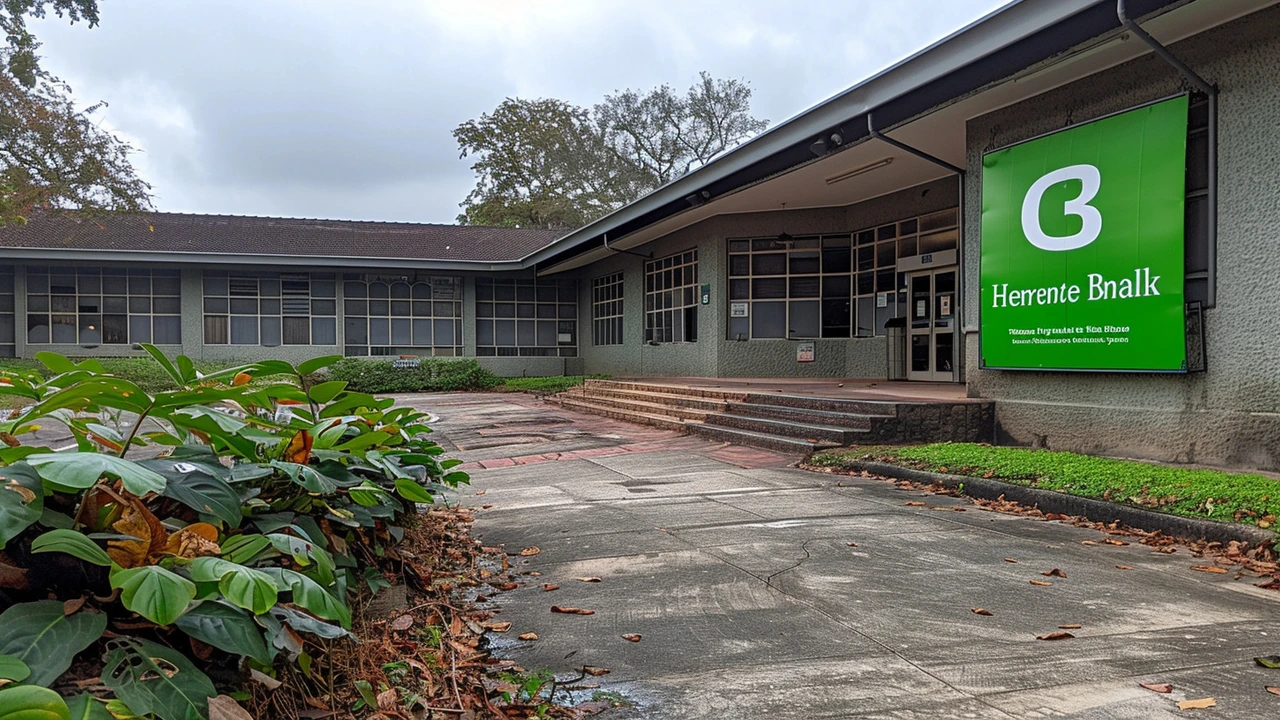The Beginning of Heritage Bank's Troubles
On Monday, several branches of Heritage Bank across Nigeria witnessed a significant development as the Nigerian Deposit Insurance Corporation (NDIC) moved to take control. This drastic measure came on the heels of the Central Bank of Nigeria’s (CBN) decision to revoke Heritage Bank's licence. The memory of the NDIC officials' unannounced visit to locations including Victoria Island, Allen Avenue, Ilupeju, and Ladiopo is still fresh in the minds of many. With at least twelve NDIC officials at each branch, the sense of urgency and seriousness of the situation was palpable.
The visit by the NDIC was described as a 'special assignment,' and sources privy to the internal workings of Heritage Bank revealed it was part of a distress resolution and eventual takeover of the institution. The CBN’s move to revoke the bank’s licence stems from serious financial issues plaguing Heritage Bank, primarily its critical under-capitalisation. For about five years, the bank had been grappling with a severe erosion of its capital base, ultimately resulting in a negative shareholder equity that ballooned to ₦900 billion, a staggering figure by any measure.
Mounting Indebtedness and Failed Recapitalisation Efforts
Heritage Bank's challenges are not new, having been an albatross on its neck since as far back as 2018. This was worsened by its high levels of indebtedness. To put things into perspective, the bank was initially given a deadline by the CBN to rectify its capital shortfall by April 2024. Unfortunately, despite numerous attempts to engage with potential investors, Heritage Bank made no significant headway towards restructuring its finances. The failure to gain traction in recapitalisation efforts proved disastrous, leading to a massive layoff of around 1,000 employees.
For many, these layoffs signaled the beginning of the end, with countless employees falling into sudden unemployment without warning. The situation also had a spillover effect on the bank's customers, who began experiencing growing difficulty in accessing their deposits. Such operational inefficiencies created panic and distrust among customers, further exacerbating the bank's troubles.

Root Causes of the Financial Collapse
To understand the root causes of Heritage Bank's meltdown, one must consider the factors that had been festering beneath the surface for years. Foremost among these was poor corporate governance. The bank's management was critiqued for a series of questionable decisions, particularly related to its loan portfolio. A notable example was the acquisition of Enterprise Bank for a substantial ₦56 billion, a move that many financial analysts viewed as imprudent given Heritage Bank’s shaky financial standing at the time.
Compounding these issues was the implementation of the Treasury Single Account (TSA) policy by the Nigerian government in 2015. This policy essentially pooled all government revenue into a single account maintained by the CBN, effectively draining a significant liquidity source from commercial banks including Heritage Bank. The subsequent liquidity crunch strained the bank’s operations, making it even more challenging to maneuver through its financial woes.
Governance and Decision-Making Pitfalls
The governance issues at Heritage Bank extended beyond just one or two bad decisions. Analysts have pinpointed a pattern of mismanagement that pervaded various levels of the bank's operations. Executives were often accused of prioritizing personal gains over corporate health, a trend that ultimately nurtured a toxic organizational culture. It is this lack of accountability and strategic oversight that many believe set the stage for the bank's eventual downfall.
Moreover, the bank’s executives appeared to lack a robust risk assessment framework, evidenced by the accumulation of bad loans that worsened its financial position. Such loans, many of which were doled out to businesses with weak credit profiles, likely contributed to its negative shareholder equity. These loans became non-performing, further weighing down the bank’s already fragile balance sheet.

The Ripple Effect on Customers and Employees
The customers and employees of Heritage Bank bore the brunt of its financial decline. For customers, the gradual inability to access funds caused significant distress. Many depended heavily on their deposits for day-to-day transactions and business operations. As news spread about the bank’s precarious state, a rush to withdraw funds ensued, intensifying the bank’s liquidity problems.
For employees, the abrupt layoffs were devastating, leaving approximately 1,000 individuals jobless in a challenging economic climate. Many expressed feelings of betrayal, having trusted the bank’s assurances that their positions were secure. The sudden job losses also created a significant human resource vacuum within the bank, impacting its ability to serve the remaining customers effectively.
Industry Reaction and Potential Impacts
The Nigerian banking sector is now closely watching how the NDIC will handle the takeover of Heritage Bank. This event has sparked discussions about the overall health and stability of other banks in the country. Financial experts warn that the Heritage Bank episode could have wide-ranging implications for investor confidence and the regulatory landscape in the Nigerian banking industry.
Other banks may come under increased scrutiny, with regulatory bodies likely to tighten oversight and proactive measures to avoid similar situations. For depositors and investors, the collapse serves as a stark reminder of the need for due diligence and cautious optimism when dealing with financial institutions.

The Road Ahead
Moving forward, the NDIC faces the arduous task of managing the bank’s operations while working towards a resolution that safeguards depositors’ interests. The potential for liquidation, merger, or acquisition remains, and each path presents its own set of challenges and opportunities. What remains clear is that the legacy of Heritage Bank serves as a cautionary tale in the banking industry, highlighting the critical importance of sound corporate governance, effective risk management, and the need for regulatory vigilance.
In conclusion, the collapse of Heritage Bank underscores the multifaceted challenges within the Nigerian banking sector. It highlights the intersection of corporate governance lapses, regulatory policies, and the impact of macroeconomic factors. As the NDIC steps in to steer the bank towards resolution, stakeholders will be keenly watching the developments, hoping for a favorable outcome that reinstates stability and confidence in the financial system.

Eduardo Lopez
June 3, 2024 AT 19:50It is absolutely disheartening to witness such reckless mismanagement in a financial institution that should be a pillar of trust. The NDIC stepping in is a moral imperative, a corrective measure that we ought to applaud rather than lament. One cannot excuse the leadership's complacency when the capital erosion was glaring for years. This whole saga reads like a cautionary tale about hubris and the neglect of fiduciary duty. Let us hope this serves as a wake‑up call for all banks to prioritize sound governance over short‑term gains.
Nancy Perez de Lezama
June 9, 2024 AT 15:33The bank’s collapse is a clear sign of poor decision‑making. It seems they never considered the impact on their customers or staff.
Matt Heitz
June 15, 2024 AT 11:16From a regulatory standpoint, the capital shortfall represents a breach of Basel III requirements that any prudent analyst would flag. The systemic risk to the Nigerian financial sector cannot be overstated, especially given the macro‑policy constraints imposed by the Treasury Single Account. Moreover, the reckless acquisition of Enterprise Bank illustrates a failure in risk‑adjusted return analysis. Nationally, we must demand stricter oversight to prevent similar debacles. The whole episode underscores the necessity for robust stress‑testing frameworks.
Susan Mark
June 21, 2024 AT 07:00I think it’s worth pointing out that the NDIC’s involvement could actually stabilize the situation for depositors. Historically, similar interventions have helped restore confidence when handled transparently. Let’s keep an eye on how they manage the transition.
Jason Jennings
June 27, 2024 AT 02:43Honestly, this is what happens when you ignore basic financial rules.
Diego Vargas
July 2, 2024 AT 22:26Did you know that Heritage Bank’s negative equity actually hit ₦900B, which is insane? I’ve read the reports and the numbers don’t lie. The recapitalisation attempts were basically a band‑aid on a broken leg. Also, the government’s TSA policy really squeezed liquidity out of the whole system. So yeah, the outcome was pretty much inevitable.
Alex Lee
July 8, 2024 AT 18:10The bank made bad loans and now it’s paying the price. Simple as that.
Vida Yamini
July 14, 2024 AT 13:53Hey team let’s take a moment to reflect on what this means for the broader industry it’s a learning opportunity for all of us and not just a headline to scroll past understanding the root causes can actually empower us to make better decisions in our own financial lives the governance failures highlighted here show how crucial transparency is and why robust risk management can’t be an afterthought really when you look at the loan portfolio missteps you see a pattern of short‑sightedness that can’t be ignored it also reminds us that policy changes like the Treasury Single Account have real ripple effects across the sector so keeping an eye on macro policies is essential as we move forward I’d suggest that anyone involved in banking consider these lessons and perhaps push for stronger oversight mechanisms and more diligent board oversight it’s not just about profits it’s about trust and stability for the customers and employees alike let’s use this moment to advocate for stronger safeguards and maybe even mentor younger professionals on the importance of ethical leadership together we can foster a healthier financial environment
James Lawyer
July 20, 2024 AT 09:36The regulatory response appears measured, yet its efficacy will depend on execution. It will be important to monitor how the NDIC safeguards depositor assets while seeking a viable resolution. Additionally, the potential for a merger or acquisition could reshape market dynamics. Stakeholders should remain vigilant regarding any shifts in competitive balance. Ultimately, a transparent process will be essential to restoring confidence.